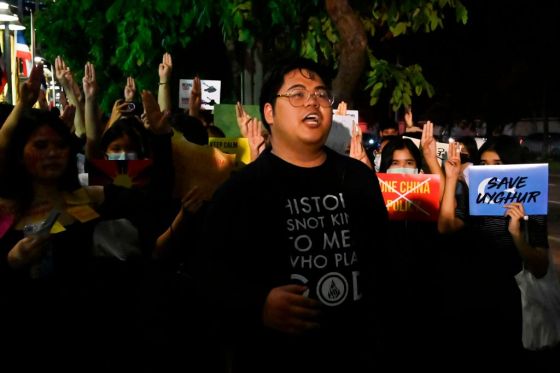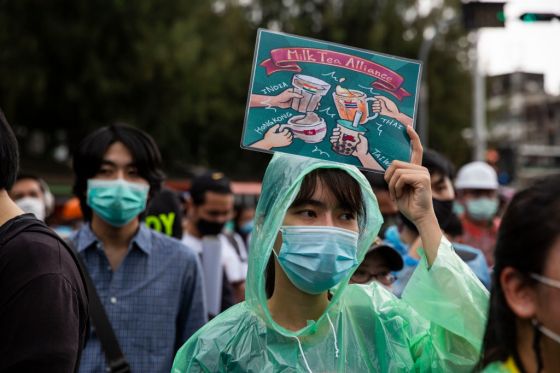‘We Share the Ideals of Democracy.’ How the Milk Tea Alliance Is Brewing Solidarity Among Activists in Asia and Beyond
On China’s National Day this year, Thai student Bunkueanun “Francis” Paothong performed a song outside the Chinese embassy in Bangkok. “Arise! Ye who would not be slaves again,” a video posted on Twitter showed him operatically singing into the humid evening.
The words famously open China’s national anthem, “The March of the Volunteers.” But they also appear in “Glory to Hong Kong”—the unofficial anthem of Hong Kong’s democracy movement—and it was this that Francis was singing at the Oct. 1 protest. “For Hong Kong, may glory reign!” he intoned.
Written and composed anonymously last year, the song has come to represent Hong Kong’s youth-driven rebellion against Beijing. But its four stanzas are now also sung in Thailand where protesters against the military-backed government and the monarchy are not only adopting tactics of resistance from their Hong Kong counterparts but are also cross-promoting causes.
Though their demands may be different, solidarity between the movements has been building for months. Activists have now joined forces in a so-called “Milk Tea Alliance,” a loose, transnational network of youth who see themselves as engaged in similar fights against authoritarianism and who have mostly come of age amid China’s growing influence in the region.
Named for a beverage popular in Thailand, Hong Kong and Taiwan, the #MilkTeaAlliance was forged in the crucible of a meme war in April that pitted Chinese nationalists against democratically minded young people in those places. But it has since spilled into something bigger.
“In each of our countries we face different issues, but when it comes down to it, we share the ideals of democracy,” Francis tells TIME.
Online, the hashtag has been used to push a boycott of Disney’s remake of Mulan and to raise awareness about China’s human rights abuses in Xinjiang and Tibet. Offline, the solidarity its has inspired has increasingly driven real-world action.

In Thailand, demonstrators have chanted “Free Hong Kong,” and waved Hong Kong democracy and Taiwan independence flags. In Taipei, activists, dissidents and students have gathered to show their support for the Thai protests.
On Hong Kong’s LIHKG, a Reddit-like platform used by protesters, threads have highlighted the benefits of cross-promotion. Hongkongers can support Thai protesters’ without being subject to harsh lèse majesté laws that criminalize defamation of the king, and Thai protesters can promote Hong Kong’s struggle without facing potential repercussions under a draconian new national security law.
“The idea is that we can speak for each other’s values within a relatively safer environment,” says Ted Hui, a Hong Kong pro-democracy lawmaker who organized an Oct. 19 rally outside the Thai consulate in support of Thai protesters.
Other politicians have taken notice. Taiwan’s vice president has used the hashtag, as has the spokesperson from India’s ruling Bharatiya Janata Party (BJP).
“I think this kind of pan-Asian collaboration and solidarity will just enhance the unity of the youth movements and also help China realize their soft power expansion and Wolf Warrior diplomacy is not working,” says prominent Hong Kong activist Joshua Wong.
The alliance, he tells TIME, has vast potential to expand. “If anyone believes in democracy and freedom and is against the authoritarian crackdown, they could also recognize themselves as part of the Milk Tea Alliance.”
Read more: Meet the Lawyer Trying to Reform the Thai Monarchy
What is the Milk Tea Alliance?
The hashtag #MilkTeaAlliance first sprang up on Twitter in April, to counter attacks by pro-Beijing trolls and bots on a Thai celebrity perceived to have slighted China. Actor and teen idol Vachirawit Chivaaree, known as “Bright,” had liked a tweet showing four different cities, including Hong Kong, with a caption that referred to them as “countries.” (Hong Kong is a semi-autonomous territory but being under Chinese sovereignty is not independent.)
Soon, he was bombarded by the kind of jingoistic outrage normally reserved for foreign brands like the N.B.A., Apple and Gap that have irked Beijing. In Bright’s case, patriotic Chinese social media users surmounted the country’s internet firewall to correct the record on Hong Kong’s status.
His apology failed to mollify the internet horde. They dug up more geopolitical offenses in social media accounts belonging to his girlfriend, Weeraya “Nnevvy” Sukaram, including an Instagram post that appeared to suggest the independence of self-ruled democratic Taiwan, which China considers part of its territory.
Bright and Nnevvy’s fans shot back with humorous memes and other counterattacks. Then, the Chinese trolls misfired: they focused their criticism on the Thai government, economy and monarchy, much to the delight of young Thai social media users who enthusiastically agreed. Hong Kong and Taiwanese users started chiming in too, sensing an ideological affinity with the Thais in the fight against autocracy and Beijing’s Twitter army.
“The authoritarian Thai government has censored us for decades … and now certain Chinese nationalists are trying to use [Chinese Communist Party] CCP propaganda to tell us what we can and cannot think about Hong Kong and Taiwan. That’s unacceptable to those of us who believe in freedom of thought and speech,” the Taiwan Alliance for Thai Democracy, a group of Thai students living in Taiwan, stated in an email to TIME.
Once the Chinese Embassy in Bangkok weighed in with a statement insisting “the recent online noises only reflect bias and ignorance,” the resistance solidified.
“While the movement started as a trend, state opposition to it has turned it into a cohesive movement for change which is spreading beyond young people alone,” says Paul Chambers, a Thai politics expert at Naresuan University’s College of Asean Community Studies.
What are the goals of the Milk Tea Alliance?
The preparation of milk tea varies in Thailand (where a food dye gives it its signature bright terracotta color), Hong Kong (where a combination of Sri Lankan black tea and tea dust give it extra potency), and Taiwan (where the addition of tapioca pearls was popularized). In similar fashion, the political struggles in each of these places have their own characteristics.
In Thailand, students have taken to the streets demanding fresh elections under a new constitution, as well as curbs to the powerful monarchy’s prerogatives. In Hong Kong, protesters fear the loss of their city’s political freedoms under an ever-encroaching Beijing. And in Taiwan, activists are anxious over the CCP’s pledge to reunify the island by force if necessary.
Yet each of these struggles also share in the existential battle between democracy and dictatorship.
“I think the alliance proves that democracy is a universal [not just Western] value,” says Tattep “Ford” Ruangprapaikitsere, one of the Thai protest organizers. “Democracy is the only form of government that gives the opportunity for all people to fulfill their dreams.”
Asian activists have also found a common adversary in Beijing—a key ally of Thailand’s military-aligned government.
“The milk tea alliance could potentially turn into a genuine transnational anti-authoritarian movement—a rejection of the Chinese authoritarian model,” says Roger Huang, a politics lecturer at Sydney’s Macquarie University. “There may be some repercussions for China: governments could justify any backlash against China’s more aggressive actions in the region by citing popular opinion.”

The coalition has come into existence as negative views of China reach fresh highs in many advanced economies, according to a recent Pew Research Center survey. While the coronavirus pandemic—which emerged in China late last year—caused a reputational hit, recent trade and diplomatic disputes with neighboring countries have also prompted anger.
According to Sitthiphon Kruarattikan, director of the Institute of East Asian Studies at Bangkok’s Thammasat University, the formation of the Milk Tea Alliance “reflects that China is still unsuccessful in cultivating soft power or winning hearts and minds of their Taiwan compatriots and neighboring countries.”
What does China say about the Milk Tea Alliance?
China’s foreign ministry has dismissed the coalition. “People who are pro-Hong Kong independence or pro-Taiwan independence often collude online, this is nothing new. Their conspiracy will never succeed,” spokesman Zhao Lijian told Reuters.
But supporters of the alliance say they are not anti-Chinese per se—instead they are simply finding affinity in their shared pursuit of liberal democracy.
Joshua Wong, in Hong Kong, insists the aim goes beyond opposition to any one country. “It’s not about being anti-Chinese government only, but [about] anti-authoritarian rule everywhere,” he says.
Read more: Why This Thai Billionaire Is Risking It All to Back Reform
Activists say the outpouring of solidarity makes them feel less alone in their struggle. Social media has also made it much easier for like-minded protesters to band together and find strength in numbers, says Veronica Mak, a sociology professor at Hong Kong Shue Yan University.
“The young people know that their political capital is weak because they don’t have money, and not many of them have political connections. But they have found support and political resonance online,” she says, and that has given them more influence.

Their camaraderie has also opened up a vital pipeline for sharing tactics.
“[We’re] not only talking, we’ve also gotten a lot of knowledge and information from the movement in Hong Kong,” says Ford, the Thai protest organizer.
From tips on staying safe on the barricades to extinguishing smoking tear gas canisters and conducting leaderless rallies that melt away before police can effectively counterattack, Hong Kong has exported its decentralized protest techniques around the world. Activists in the United States, Catalonia, Nigeria and Indonesia have all borrowed from Hong Kong’s playbook.
Some supporters of the Milk Tea Alliance see an opening to join forces across all these movements.
“Injustice anywhere is a threat to justice everywhere,” self-exiled Hong Kong activist Nathan Law recently tweeted, quoting Martin Luther King while expressing support for Thailand and the Milk Tea Alliance.
And while the alliance remains a fledgling movement for now, it has potential for growth.
“We are connected via these common dreams,” says Netiwit Chotiphatphaisal, a prominent Thai activist. “It empowers us to have more energy to fight.”
Comments
Post a Comment